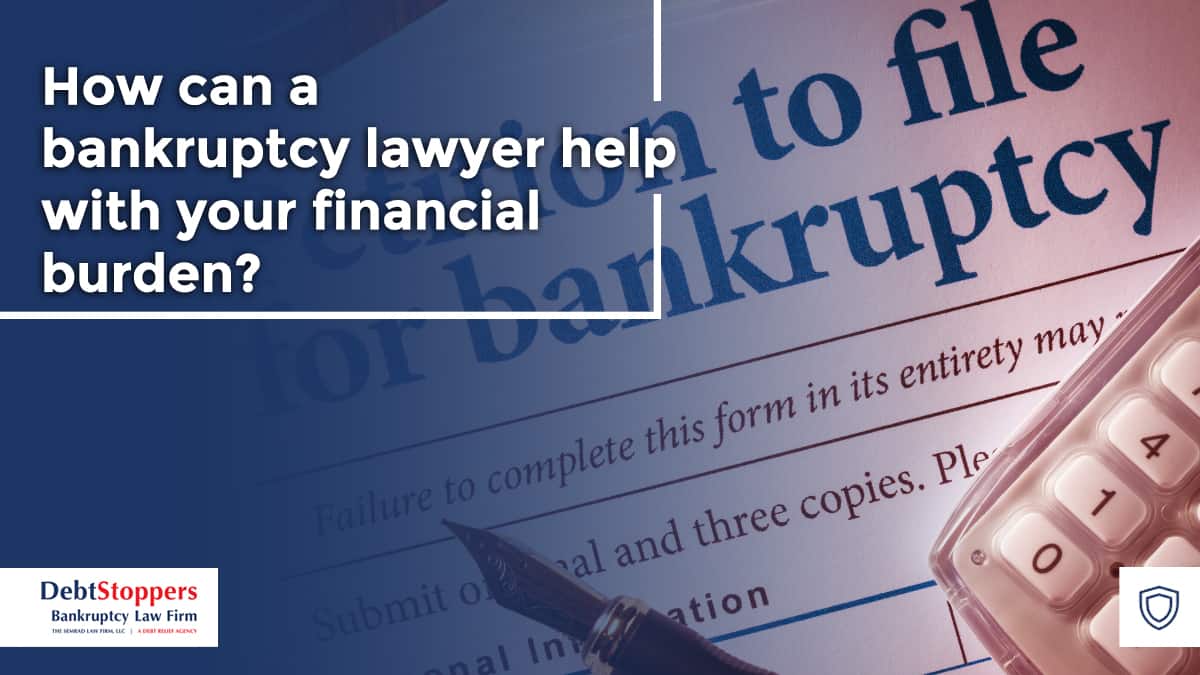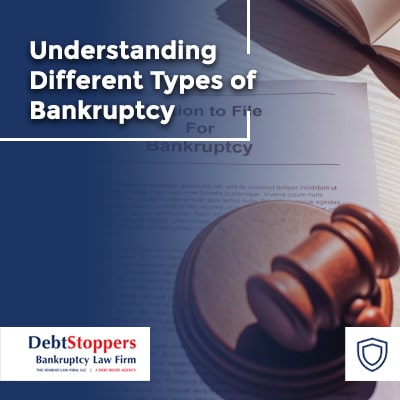How can a bankruptcy lawyer help with your financial burden?

A bankruptcy lawyer can review your financial situation to determine if bankruptcy is the best option for you. An experienced bankruptcy attorney can explain the different types of bankruptcy and advise you on which debts can be discharged, which assets you can keep, and any potential consequences.
Introduction to Bankruptcy and Financial Burden
Bankruptcy is a legal process that helps people who are unable to repay their outstanding debts. It offers a fresh start by eliminating debts (Chapter 7) or creating a repayment plan (Chapter 13). Filing for bankruptcy halts collection efforts, stops foreclosures, and discharges certain types of debt. When appropriate, bankruptcy can provide significant relief to people who have unmanageable debt.
Financial burden generally refers to the overwhelming pressure that results from being unable to meet financial obligations. This can result from various factors, including job loss, medical expenses, poor financial management, or unexpected emergencies. The stress of mounting debt can impact mental health, relationships, and overall quality of life.
Understanding Bankruptcy
There are numerous benefits of bankruptcy for people facing overwhelming debt. Bankruptcy provides debt relief by allowing people to discharge many unsecured debts, such as credit card debt, medical bills, and even taxes.
Bankruptcy also provides real protection from creditors. Once your attorney files your petition with the bankruptcy court, an automatic stay goes into effect immediately, stopping most collection activities, including lawsuits, wage garnishments, and harassing phone calls.
Bankruptcy can provide a necessary lifeline for people overwhelmed by debt. Consulting with a bankruptcy lawyer can provide personalized guidance, helping individuals navigate the complexities of the process and work toward a fresh financial start.
The Role of a Bankruptcy Lawyer
A bankruptcy lawyer will help handle all the complexities of the bankruptcy process, reducing your stress and allowing you to focus on rebuilding your financial future.
Bankruptcy involves a lot of paperwork and strict deadlines; a bankruptcy lawyer can help you prepare and file all necessary documents accurately and on time. An attorney can also represent you in court, during creditor meetings, and negotiations with creditors, ensuring your rights are protected.
A bankruptcy lawyer plays a vital role in ensuring that the bankruptcy process is handled smoothly, efficiently, and in accordance with the law, ultimately providing you with the best possible chance for a fresh financial start.
Overview of Bankruptcy Lawyer's Duties
A bankruptcy lawyer will assess your financial situation, including income, debts, assets, and expenses, to determine whether bankruptcy is appropriate. Based on your financial circumstances, the lawyer will advise you on whether to file under Chapter 7, Chapter 13, or if there are other potential alternatives for you to consider.
One of the most important duties of a bankruptcy attorney is to help you gather and complete all necessary documentation, including bankruptcy forms, financial statements, and other required paperwork. Your lawyer will help you fulfill all pre-filing requirements, such as mandatory credit counseling and debtor education courses.
Your lawyer will file your bankruptcy petition with the court, initiating the bankruptcy process and triggering the automatic stay, which halts most creditor actions against you.

The Importance of Legal Representation in Bankruptcy
Bankruptcy lawyers have specialized knowledge and experience in bankruptcy law, which can help you navigate the complex legal landscape more effectively.
Most importantly, hiring a bankruptcy lawyer increases your likelihood of a successful outcome in your case.
Evaluate Your Finances
A bankruptcy attorney will conduct a detailed financial review of your income including wages, salaries, bonuses, rental income, alimony, child support, and any other sources of regular income. This helps determine your ability to repay debts and your eligibility for different types of bankruptcy.
A thorough examination of your monthly expenses will also be conducted, including housing costs, utilities, groceries, transportation, medical expenses, insurance, and other regular expenses. This helps the attorney understand your cash flow and financial obligations.
An inventory of all your assets will be made, including real estate, vehicles, bank accounts, retirement accounts, investments, valuable personal property, and any other assets. The attorney will assess the value of these assets and determine what can be protected through exemptions.
Debt Analysis
In a bankruptcy proceeding, debt analysis is crucial to understand the debtor's financial situation and determine the appropriate course of action.
By conducting a thorough and meticulous analysis of your debt, a bankruptcy attorney can provide the best possible advice and representation, ensuring that you navigate the bankruptcy process smoothly and increase your chances for a fresh financial start.
Exploring Bankruptcy Options
It’s important to understand the various bankruptcy options. Your bankruptcy attorney can help walk you through your options and determine which type of bankruptcy is best for your situation.

Understanding Different Types of Bankruptcy
The two most common types of bankruptcy are Chapter 7 and Chapter 13.
Chapter 7 Bankruptcy is also known as liquidation bankruptcy, this option involves selling non-exempt assets to pay off creditors. Remaining eligible debts are then discharged, allowing the debtor a fresh start. It's typically suited for those with limited income and assets.
Chapter 13 Bankruptcy is also known as reorganization bankruptcy. It allows individuals with regular income to develop a repayment plan, usually over three to five years. Debtors can keep their assets while catching up on missed payments.
Navigating the Bankruptcy Process
A lawyer can significantly ease the burden of navigating the bankruptcy process by providing expertise, guidance, and representation at every stage.
The Role of a Bankruptcy Lawyer in Filing for Bankruptcy
From the initial consultation and evaluation, a lawyer can help assess your finances and advise you on which type of bankruptcy is best for your situation. Your lawyer will also help ensure the correct documents are collected and will file your petition with the bankruptcy court.
Once your attorney files your petition with the bankruptcy court, an automatic stay goes into effect immediately. Your attorney will manage all communications with your creditors and debt collectors and represent you at the 341 meeting of creditors and any court hearings.
Additionally, your attorney will help provide post-bankruptcy guidance and ongoing legal support throughout the bankruptcy process and beyond.
By managing these tasks, an experienced lawyer ensures that the bankruptcy process is as smooth and stress-free as possible while maximizing the chances of a successful financial recovery.
Legal Support during Creditors' Meetings
A bankruptcy lawyer will represent you at all bankruptcy hearings, including the meeting of creditors (341 meeting) and any other necessary court appearances.
The lawyer will negotiate with creditors on your behalf, potentially reaching agreements on repayment plans, reaffirmation agreements, or other matters.
Representation in Bankruptcy Court
A bankruptcy attorney will represent you at all bankruptcy hearings and manage communications with the bankruptcy trustee and the court, ensuring that all requests for information are promptly and accurately addressed.
The lawyer will help you identify and claim exemptions to protect as much of your property as possible under state and federal laws.
Dealing with Creditors and Debt Collectors
Your bankruptcy attorney acts as an intermediary between you and the creditors/debt collectors, ensuring that all legal processes are followed and your rights are protected.
They will communicate with your creditors and debt collectors on your behalf, represent you in meetings and court hearings, negotiate with creditors, and take action against any violations of the automatic stay.
Post-Bankruptcy Guidance
After the bankruptcy is discharged, your lawyer can provide advice on rebuilding your credit and financial stability, including steps to improve your credit score and manage your finances effectively.
Your lawyer can assist with any future legal issues related to your bankruptcy, such as addressing any creditor actions that violate the discharge injunction.
Client: https://www.debtstoppers.com/.





